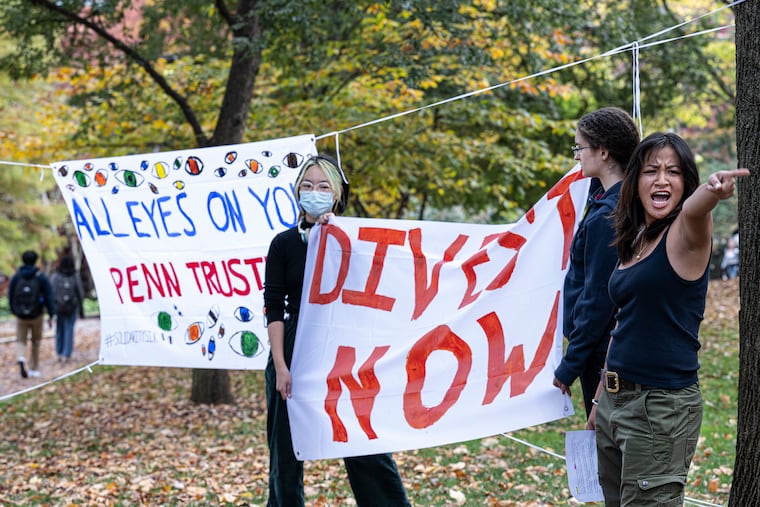Penn students file complaint with Pa. Attorney General over university’s fossil fuel investments
The 67-page complaint argues that fossil fuel investments expose the community to “severe injury.”

University of Pennsylvania students filed a complaint with Pennsylvania’s Attorney General on Monday, alleging the school’s investments in fossil fuel companies are not only immoral, but illegal.
The 67-page complaint — filed by the environmental activist group Fossil Free Penn — urges Attorney General Michelle Henry’s office to investigate Penn’s board of trustees for investing some of the university’s $21 billion endowment in an industry that has exacerbated the global climate crisis.
That crisis, in turn, is “damaging the world’s natural systems; disproportionately harming youth, low-income people, and communities of color; and imperiling the university’s financial and physical condition,” the complaint says.
“In the midst of the climate crisis, powerful institutions must take responsibility for their contributions to global warming,” says the complaint, which is endorsed by over 40 Penn faculty members and around 20 university-affiliated groups. Five other universities also joined the filing.
Citing Pennsylvania law that dictates how nonprofits can invest their money, Fossil Free Penn said that Penn violated its responsibility to act in good faith and further the purposes of the school.
A spokesperson for the Office of the Attorney General declined to comment.
Ron Ozio, the university’s director of media relations, said that Penn had “thoughtfully reviewed requests to divest from fossil fuels,” and pointed to its message on sustainability. The university has said it does not directly invest in fossil fuels — including the 200 companies with the largest potential carbon emissions in their reserves — but some of its endowment is invested with firms that do so.
Around 20 activists with Fossil Free Penn gathered near university’s Van Pelt Library on Monday afternoon to announce their filing. They chanted slogans such as “Penn trustees serve oil companies” while students bustled between classes.
“If this institution aspires to be a true leader, upholding positive values and moral standards, it must recognize its moral obligation and its legal duty to divest from fossil fuels,” said Katie Francis, a senior communications major. “Now we bring the full weight of a legal argument into the fight.”
In addition to alleging that Penn violated its mission as a charitable organization, the complaint alleges that the university’s investments have exposed its community to “severe injury.”
Those harms, according to Fossil Free Penn’s citation of a 2021 Pennsylvania Department of Environmental Protection assessment, are the result of climate change and include increased average temperatures, heavier precipitation and inland flooding, heat waves, landslides, sea level rise, and more severe cyclones.
The filing is the latest development in the activist group’s nine-year campaign.
The conflict came to a head last fall, when Penn’s administration pursued over 30 cases of disciplinary action against student climate protesters.
More than 850 people signed a petition calling on Penn to drop the charges and refrain from further action against peaceful protests.
Penn stood by its disciplinary policy, as well as its financial strategy.
In a blog post last year by Penn’s president, Liz Magill, and Scott L. Bok, chair of its board of trustees, the administrators said that they shared “the same goal of a decarbonized economy,” but that the university was balancing that with the “significant role that fossil fuels play in today’s world.”
Addressing some of the concerns, Penn said it had changed the nature of its relationships with its outside investors, who hold a majority of the university’s endowment.
One of those changes includes ending new “private equity vehicles” devoted to fossil fuels. The university also said it expects its financial managers to conduct “rigorous” evaluations of the fossil fuel companies they invested with that have not considered reducing their emissions.
“We must move away from fossil fuels, but we can only do so completely once we can produce abundant, affordable, and secure energy from carbon-free sources,” the university’s statement said. “This energy transition still requires trillions of dollars in new investments, major new policy developments, and significant technology advances.”
The university’s announcement that it no longer directly held fossil fuel investments came around the time of the student arrests last year. That commitment was bolder than what the university offered two years earlier, when Penn said it said it was no longer directly investing in companies focused on the carbon-intensive production of tar sands or thermal coal.
Protesters on Monday acknowledged Penn’s efforts but said those commitments — and Penn’s goal of getting its endowment net-zero on carbon by 2050 — were not enough.
They pointed to the Canadian wildfires — blazes climate scientists say were likely made worse by climate change — that swallowed Philadelphia’s skyline in ominous, hazy smoke this summer.
“We can pretend that the climate catastrophe is coming for us in the near future, said Taja Mazaj, a senior political science major. “But it’s already here.”